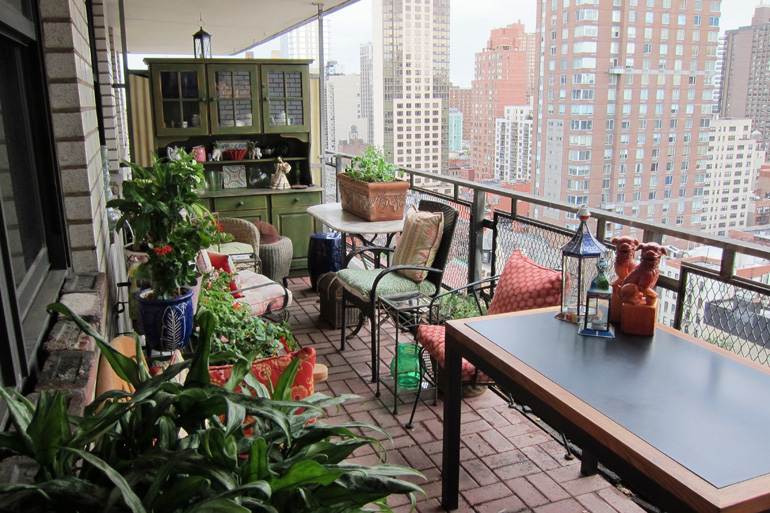August:
Restoration
29 August 2011
After I’d finished putting everything back out where it belonged on the balcony — for good measure, I washed the mud-spattered bedroom windows — I sat for a while beneath what I realized was the last of Irene, a counter-clockwise roil of lowering clouds from which rain did not fall. Then I got dressed and persuaded Kathleen to take a short walk up and down our block, just to see what was what. And what we saw was that most of the restaurants were open. Gristede’s was open. It was comforting to note that the new storefront medical center across the street was also open. We decided to go to a restaurant that we haven’t been to in a while, but it was too early in the day for that, so we went back upstairs, amused at the gusting raindrops that had come out of nowhere, as if to remind us that we’d just dodged a hurricane.
Later, just before bed, I brought my nightcap out to the bench and sat down again. Splotchy grey had given way to velvety midnight blue. Beneath the transcendently clear sky, thousands of lights gleamed from thousands of apartment windows, here and in Queens. The red light atop the New York State Pavilion was blinking nicely (it lies beneath the approach to LaGuardia). All was in order, or appeared to be, and I felt enormous gratitude.
(I’m not one of those people who has to know to whom or what gratitude is owing in order to feel grateful. A small portion of my gratitude is, however, earmarked for Mayor Bloomberg, who’s a firm but well-intentioned grown-up if there ever was one.)
Walking on the beach at Fire Island, two weeks ago, I thought about being tumbled by the surf and the inherent dangerousness of what we call Nature. I lost the taste for natural wonders very early, if, indeed, I ever had it; the only bit of scenery that has ever impressed me deeply is the view from the hotel at Lake Louise, in the Canadian Rockies, because there, for once, Nature got it right, and arranged the mountains and the glacier and the lake and even the sky just as a gifted landscaper would, given the power to do so. For the most part, Nature’s effects — canyons, waterfalls, Matterhorns — strike me as the products of a very troubled adolescent, a kid who needs help. This is a minority view nowadays, but, prior to the Nineteenth Century, it was an almost universally shared understanding. Nobody, except perhaps for philosophers, ever used to walk on the beach, not back then.
By the time Irene reached Manhattan, it was just another summer storm, as incapable as they all are of dinging our town. And, just like every other summer storm, it wreaked havoc in the suburbs. Being a very big summer storm in terms of expanse, it wreaked havoc in all the suburbs, and cleaning up after Irene is going to take a long time and cost millions if not billions. How long will it take for people to grasp that the suburban way of life is not sustainable?
Ultimately, Nature prevails. If nothing else, tectonic plates will eventually drag New York City into the ocean, or push it underneath New Jersey. But there is something meaningless about that destiny, because it will take so long to happen that no one human being, nor even a human civilization, will see it happen. People will come and go too quickly to notice. On the storm-tossed time scale that does register with me, I’m not cocky about Irene’s failure to make Manhattan life miserable. I’m just grateful that it didn’t, grateful that it did no harm to my family. For a few moments last night, looking out at the world I love, I was touched by serenity. I won’t forget it.

